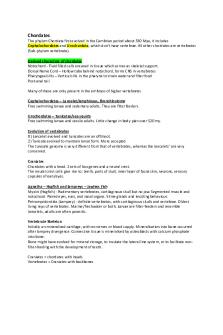History 1010 lecture 12 PDF

| Title | History 1010 lecture 12 |
|---|---|
| Author | katana seal |
| Course | Early United States History |
| Institution | Tennessee Technological University |
| Pages | 6 |
| File Size | 147.6 KB |
| File Type | |
| Total Downloads | 58 |
| Total Views | 140 |
Summary
History 1010 lecture 12...
Description
Lecture Outline #12 I. Second Continental Congress: Independence Cometh! (Philadelphia, May 1775-December 1776) A. To declare Independence or not, that is the question? 1. Independence--January 1776 Neither all Colonists nor all members of Congress ready to declare Independence by January 1776 2. Reconciliation? = Olive Branch Petition a. colonists' loyalty? o Colonists reaffirm loyalty to the king o NOT Parliament 3. Document: Samuel Seabury's, Argument Against Independence (1775) Samuel Seabury—A Connecticut minister Which side is he on in the American Revolution? o The British, which makes him a loyalist Where has he taken refuge? o New York City Samuel Seabury refers to what foreign power? o Continental Congress, he calls it an illegal body because they aren’t supposed to be meeting. Who is giving the delegates authority to meet? o Colonists What authority is in each of the colonies? o Colonial legislatures They govern by the pleasure of king George III and parliament o Seabury said that the legislatures don’t have the authority to create the continental congress o Seabury said that the king has allowed the legislatures but the legislatures don’t have the authority to be in a group, continental congress. What does he say? o Continental congress is a foreign power
II. Thomas Paine, Common Sense (1776) “The Penis Mightier than the Sword” –Thomas Paine’s Common Sense (1776) A. Paine’s goal Convince Americans that independence was both necessary and achievable o A lot of colonists were nervous about declaring independence B. Paine’s audience All colonists o Very simple language so EVERYONE could understand o “I offer nothing more than simple facts, plain arguments and common sense” C. Paine writing style very simple and understandable
1|Lecture Outline #12
D. Consequences of being in British Empire wanted them to understand the consequences of British Empire “Never were [they] our enemies as Americans, but as our being the subject of Great Britain” wants to make it clear that the king wants it to seem that they are the freest people and they won’t make enemies E. Hereditary & monarchical rule The idea that the King is “better” than you shouldn’t be believed The idea that some people were born “better” “Male and Female are the distinctions of nature, good and bad the distinctions of heaven; but how a race of men (hereditary kings) came into the world so exalted above the rest, and distinguished like some new species, is worth inquiring into, and whether they are the means of happiness or of misery to mankind” –Paine asked, why should any man be exalted above others as a king was? F. Psychological barrier “There is something absurd in supposing a Continent to be perpetually governed by an island” –Paine o we are so much bigger than them G. Common Sense's royalties to whom? 100 to 100 million copies were sold January 1776 Huge money for Thomas Paine if only he had accepted it o He didn’t accept any of it He gave all the royalties to George Washington’s Continental Army H. What did it do? Removed last psychological barrier o 75% of the American Colonist on board with Independence (3/4) III. Declaring Independence made easier A. Lord Dunmore's Proclamation (Nov . 1775) made independence an easier decision for those on the fence by British=slave liberators gave freedom to any blacks, i.e. slaves promises that if blacks(slaves) joined the cause they would give them their freedom guaranteed freedom some slave owners gave the slaves to fight for the British but some had to escape from their owners 5,000 blacks fought for the British for southern colonists this pushes some people over towards independence especially if you are a patriot slave owner
B. escalation of military conflict 1. Fort Ticonderoga, New York (May 1775) 2|Lecture Outline #12
o Vermont and Massachusetts militiamen quickly captured Fort Ticonderoga (NY) May 1775 o Lightly manned fort o Didn’t have many British soldiers o 59 cannons at this fort o colonist now have cannons 2. Washington & Boston (July 1775-March 1776) o Geroge Washington races to Boston July 3, 1775 o British outnumbered o Washington’s Problem Not enough fire power o Washington’s solution Winter 1775-76 Col. Henry Knox brings Ticonderoga’s guns to Boston o Boston Liberated, March 1776 making independence easier C. additional incentives 1. France = alliance colonists and France become alliances France is not exactly where they want to go back to war with the British They secretly start to send French advisors to train the green soldiers Slowly start to send money (loans) and supplies o They want to see if they can win first 2. German Hessians German soldiers who have fought all over the globe for money Colonists want other people to do the fighting for them 30,000 German Hessians were hired to help augment the numbers they fight dirty highly trained mercenaries o hire to kill IV. Declaration of Independence A. Southern Colonies take the lead & press for independence, 1776 B. holdouts Pennsylvania, Maryland, New York, and South Carolina o Latter 2 colonies large loyalist populations South Carolina and New York – strongest loyalist populations The northern colonies didn’t want to declare independence first o They wanted South or Mid-Atlantic colonists C. North Carolina April 1776 North Carolinas legislatures get behind independence North Carolina legislatures send letter to delegates letting them know that they can now support independence but they can’t introduce it D. Virginia Virginia’s legislature approves independence, May 15 1. Richard Henry Lee 3|Lecture Outline #12
o Richard Henry Lee Resolution, June 7 He gets up and introduces a new resolution to declare independence Now the continental congress can debate independence o Most distinguished New England delegate E. Independence adopted, but when? July 2, 1776 o All but 1 colony approved They didn’t vote against but they chose not to vote New York b/c they were waiting for the instructions o Day of independence, America’s birthday F. Why the 4th of July? Need to put “independence” in ink! We like to put down our rights, liberties, and laws on paper because it’s proof that it is there 1. who is selected 2. Who is selected to draft a declaration? a. Benjamin Franklin (Penn.) b. John Adams (Mass.) c. Thomas Jefferson (Va.) They have their influence on this document Thomas Jefferson got more credit for the document 3. The Declaration of Independence a. Jefferson’s Preamble articulated principles of: 1. equality = “that all men are created equal” Rich white men 2. natural rights = “life, liberty, and the pursuit of happiness” 3. consent of governed = true basis for true basis for government 4. right of revolution = British government had violated its contract with the colonists b. List of grievances against? A list of 27 grievances against King George III 1. Slavery? They blamed King George III for bringing slavery to our shores 2. Indians? They blame King George III and the British Empire o Called them merciless Indian savages c. July 4? delegates signed? Jefferson text formally adopted by Congress, July 4, 1776 o New York switches for a unanimous vote (July 14) Delegates sign, August 2, 1776 o 39 delegates signed July 8, 1776, 1st Public reading of Independence
V. Declaring Independence is one thing, winning independence is another: some stats & facts on paper A. On Paper = clear advantage military advantage 1. Loyalists/Tory = British sympathizer 4|Lecture Outline #12
2. stats 21,000—loyalists slaves—5000 hessians—30,000 B. On Paper = clear American military disadvantage 1. bonuses No professional army in America Weak Militia C. Americans fighting for a _____________ 1. Black Patriots a. substitutes b. 1st ________ ________ regiment 2. General George Washington VI. American Revolution May-December 25, 1776 A. How has it been going for the Rebels? Troop Morale?
VOICE THREAD LECTURE BEGINS HERE (or there about) VII. American Revolution December 25, 1776-January 1777: George Washington’s Gamble A. Time for some more Paine! 1. "The American ________, Number 1" B. The Battles of Trenton & Princeton 1. Battle of Trenton a. Hessians & Christmas in Trenton b. Crossing the Delaware River c. Results--who wins? 2. The Battle of Princeton a. Results—who wins? 3. Historical Significance a. American morale b. Marquis de Lafayette 1. Who sent him? Why was he sent? VIII. American Revolution (1777-83) A. Battle of Saratoga 1. Results? 2. Significance a. Benjamin Franklin goes where? B. Valley Forge, Pennsylvania (1777-78): Continental Army Winter Quarters 1. army suffers 2. Friedrich von Steuben C. Victory in the South 1. Lord Charles Cornwallis 2. Americans adopt a winning strategy against British in the South a. Francis Marion “The Swamp Fox” b. Nathanael Greene D. Battle of Yorktown 1. Surrender (Oct. 17, 1781) 5|Lecture Outline #12
REVIEW: mass gov. act: revoked the charter and the people could only meet annually Murder act: if British officials/soldiers killed a colonial official they would be trialed in novaschocia or Britain and they wouldn’t get charged Quartering Act: if British troops came knocking on their door the colonists had to let the live there and feed them and clothe them What is the importance of Yorktown?
6|Lecture Outline #12...
Similar Free PDFs

History 1010 lecture 12
- 6 Pages
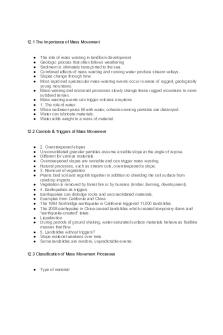
12 - Lecture notes 12
- 3 Pages
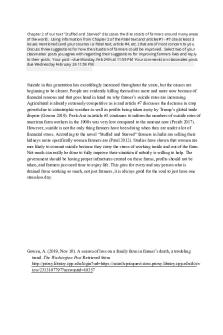
AG 1010
- 2 Pages
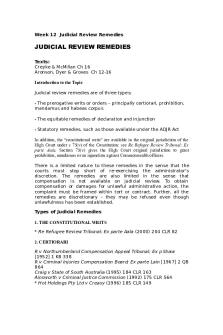
Lecture notes, lecture 12
- 9 Pages

Lecture notes, lecture 12
- 7 Pages

Lecture 12
- 7 Pages

Lecture 12
- 3 Pages
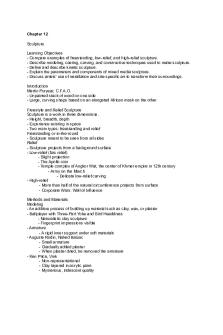
Chapter 12 - Lecture notes 12
- 4 Pages

Lab 12 - Lecture notes 12
- 5 Pages
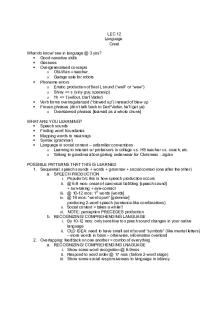
LEC 12 - Lecture notes 12
- 3 Pages
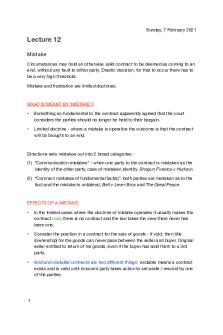
(12) Mistake - Lecture notes 12
- 8 Pages

Chapter 12 - Lecture notes 12
- 9 Pages

Diplo History Lecture Notes
- 12 Pages

Lecture notes, lecture 1-12
- 64 Pages
Popular Institutions
- Tinajero National High School - Annex
- Politeknik Caltex Riau
- Yokohama City University
- SGT University
- University of Al-Qadisiyah
- Divine Word College of Vigan
- Techniek College Rotterdam
- Universidade de Santiago
- Universiti Teknologi MARA Cawangan Johor Kampus Pasir Gudang
- Poltekkes Kemenkes Yogyakarta
- Baguio City National High School
- Colegio san marcos
- preparatoria uno
- Centro de Bachillerato Tecnológico Industrial y de Servicios No. 107
- Dalian Maritime University
- Quang Trung Secondary School
- Colegio Tecnológico en Informática
- Corporación Regional de Educación Superior
- Grupo CEDVA
- Dar Al Uloom University
- Centro de Estudios Preuniversitarios de la Universidad Nacional de Ingeniería
- 上智大学
- Aakash International School, Nuna Majara
- San Felipe Neri Catholic School
- Kang Chiao International School - New Taipei City
- Misamis Occidental National High School
- Institución Educativa Escuela Normal Juan Ladrilleros
- Kolehiyo ng Pantukan
- Batanes State College
- Instituto Continental
- Sekolah Menengah Kejuruan Kesehatan Kaltara (Tarakan)
- Colegio de La Inmaculada Concepcion - Cebu

